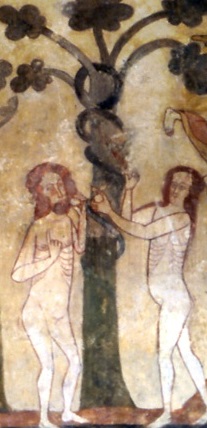Performing Plays
Piecing together the evidence

This production of the Baptism of Jesus pageant performed in York in 2014 used evidence from the text itself, and from original documents and pictures, to present an authentic effect. The angels were dressed all in feathers, as in some contemporary art, and masked: we have evidence that supernatural characters in plays did wear masks or had gold-painted faces. They are singing the hymn ‘Veni Creator Spiritus’ at the moment when John the Baptist baptises Jesus.

This Durham manuscript shows musical notation from the same period as Laurence of Durham’s Peregrini, which was performed in Durham in 2016 using music taken from this manuscript.
Here’s a clip from the final triumphal hymn:
You can also find out more about the music and how it was pieced together for our modern performance.
Performing Noah
In Hull in the 15th and 16th centuries, the Trinity Guild of the Mariners performed a unique Noah play on Plough Day in January. Their movable stage was a miniature, properly-built ship on wheels: the accounts for 1485-87 include nearly 30s. paid for repairs and new wheels for ‘the shipp’, to the actors playing Noah (12d.), Noah’s Wife (8d.) and God (10d.), plus new mittens for Noah and repairs to his cloak. The parish clerk of Holy Trinity and the choir (‘his Childer’) were often paid ‘for singing in the shipp’ and the town band, called waits, were also paid ‘ffor goyng aboute the town with the shipp’. Between performances the ship was hung from the roof of Holy Trinity church!
Performing Adam and Eve
This beautifully-written manuscript records an agreement between the town authorities of Beverley and the local guild of Hairers (who made cords and other items from horsehair).


Beverley, Great Guild Book (ERA BC/II/3), f. 13: Hairers’ agreement for ‘Paradise’ play, 12 January 1392.
Ordinacio ludi vocati paradyse per hayrers ville Beuerlaci
Item die veneris proximo post festum Translacionis sancti Willelmi Anno domini .MoCCCo nonogesimo primo venit Iohannes de Erghes hayrer in gilda Aula coram xij Custodibus ville Beuerlaci & manucepit pro se & sociis suis eiusdem artis ludere quemdam ludum vocatum paradise sufficienter vz quolibet anno in festo corporis christi quando alij artifices eiusdem ville ludunt durante vita ipsius Iohannis Erghes sumptibus suis proprijs volens & concedens se soluere communitati ville Beuerlaci tociens quociens deficerit in ludo predicto x. s. per plegium Nicholai ffauconer Aceciam manucepit reliberare .xij. Custodibus ville qui pro tempore erunt in fine vite sue omnes res necessarias quas ipse habet pertinentes ludo predicto sub pena xx s. vz j karre/ viij hespis/ xviij stapils/ ij visers. ij Wenges Angeli/ j firsparr/ j Worme / ij paria caligarum linearum ij paria camisiarum j gladius!
Paradise’ agreement: translation
Ordinance of the play called Paradise by the Hairers of the town of Beverley
Item on Friday next after the feast of the Translation of St William AD 1391 John of [Erghes] Arras, Hairer, came into the Guild Hall before the 12 Keepers of the town of Beverley and undertook on behalf of himself and his fellows of the same craft to play a certain play called Paradise satisfactorily, viz. in any year on the Feats of Corpus Christi when other craftsmen of the same town play, during the life of John of Arras himself, who agreed willingly to pay at his own personal cost 10 s. to the Community whenever he may default in the aforesaid play on the pledge of Nicholas Fauconer. He also undertook to release at the end of his life to the 12 Keepers of the town for the time being all the necessaries of the said play that he himself has, under the penalty of 20 s., viz. 1 wagon, 8 hasps, 18 staples, 2 masks, 2 angel’s wings, 1 fir pole, 1 serpent, 2 pairs of linen hose, 2 pairs of shirts, 1 sword.
It provides for the care of some of the ‘necessaries’ for the guild’s Corpus Christi pageant of the temptation of Adam and Eve by Satan, and the list includes not only clothes for Adam and Eve but a pair of angel’s wings (perhaps like the ones in the Baptism above?) and ‘1 Worme’ – a serpent: Satan’s disguise. Prop or costume?

